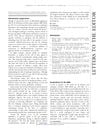Hospitalists for the NHS: The Role of Androgens and Antiandrogen Therapy in Hidradenitis Suppurativa
December 2000
in “
Journal of the Royal Society of Medicine
”

TLDR Antiandrogen therapy may help treat hidradenitis suppurativa.
The document includes a letter to the editor discussing the review on hidradenitis suppurativa (HS) by Dr. Mortimer and Mr. Lunniss, specifically addressing the role of androgens and antiandrogen therapy in HS. The authors, B.C. Gee and R.P. Dawber, argue that while the review suggests a lack of apocrine sensitivity to androgens based on enzyme activity studies, this conclusion is misleading because it does not consider androgen response at the receptor level. They highlight that finasteride, an inhibitor of testosterone to dihydrotestosterone conversion, showed benefits in 4 recalcitrant cases of HS. They also note that observational studies have linked HS flares to premenstrual periods and anovulatory cycles, and that HS patients often have conditions like acne and hirsutism, which are androgenic. Despite conflicting views on the role of androgens in HS, the authors advocate for the use of antiandrogen therapy, such as Dianette, in female patients without contraindications, and emphasize the potential efficacy of high-dose cyproterone acetate. They conclude that antiandrogen therapy can be clinically helpful in managing HS.




